The Ticker: Modern business life

On today's blog:
- This quirky ACMA video vindicates Telstra's major investment in Wi-Fi
- One grid that pretty much sums up how ‘digital natives' operate
- An almost fool-proof way of detecting a fake social media following
- Apple becomes first company to top $US700bn market value
- Does age matter? A Q&A with two young hotshot executives
- Interesting reads from around the web
Got something you would like to add to the blog? Email (harrison.polites@businessspectator.com.au) or get in touch on Twitter.
3.20pm - This quirky ACMA video vindicates Telstra's major investment in Wi-Fi
This time last week, Telstra switched on the first 150 of its anticipated 1000 free Wi-Fi hotspots. It's all part of a wider plan to blanket Australia's major cities in Wi-Fi services and, in turn, offer Telstra customers another reason to stick with the telco.
The network is only open to the public until it is fully rolled out. From there, it can only be accessed by Telstra subscribers, and other users will be forced to buy a temporary pass if they wish to use it.
It's a significant and risky investment. After all, Wi-Fi eats into the telco's main driver of customer revenue: mobile data. It's why other operators around the globe have been reluctant to roll out Wi-Fi as part of their network strategy.
But new research from the Australian Communications and Media Authority hints that Telstra may be onto a winner with its latest plan.
Even without its new network in place, use of Wi-Fi hotspots around the country grew 21 per cent in the past year ending June. It's largely due to the fact that even without Telstra's influence, the number of hotspots has grown sixfold since 2009. That statistic likely hints at the real reason why Telstra is jumping into Wi-Fi: it doesn't want to miss out on this trend. It's also clarifies why Optus is also looking to implement a similar plan.
ACMA explains the rest of its findings for their annual Wi-Fi study in the video below.
A word to the wise: mute the volume. You'll thank me later.
1pm - One grid that pretty much sums up how ‘digital natives' operate
Frédéric Filloux's Monday Note typically talks about change in the media landscape, but this week's post has some interesting implications for all businesses.
It contains this grid outlining how legacy media stack up against ‘digital natives'. Again, at first glance, irrelevant to everyone except those in media.
But while the industries are different, the lessons are universal. It's essentially a blueprint for how lean, web-focused organisations take on incumbent companies. On the legacy media side, it also outlines the mistakes companies make when trying to adapt to digital disruption. Ignore the part about funding, which is only relevant to the media industry, as well as the purple dots (they denote legacy media's likelihood to adopt its disruptor's tactics).
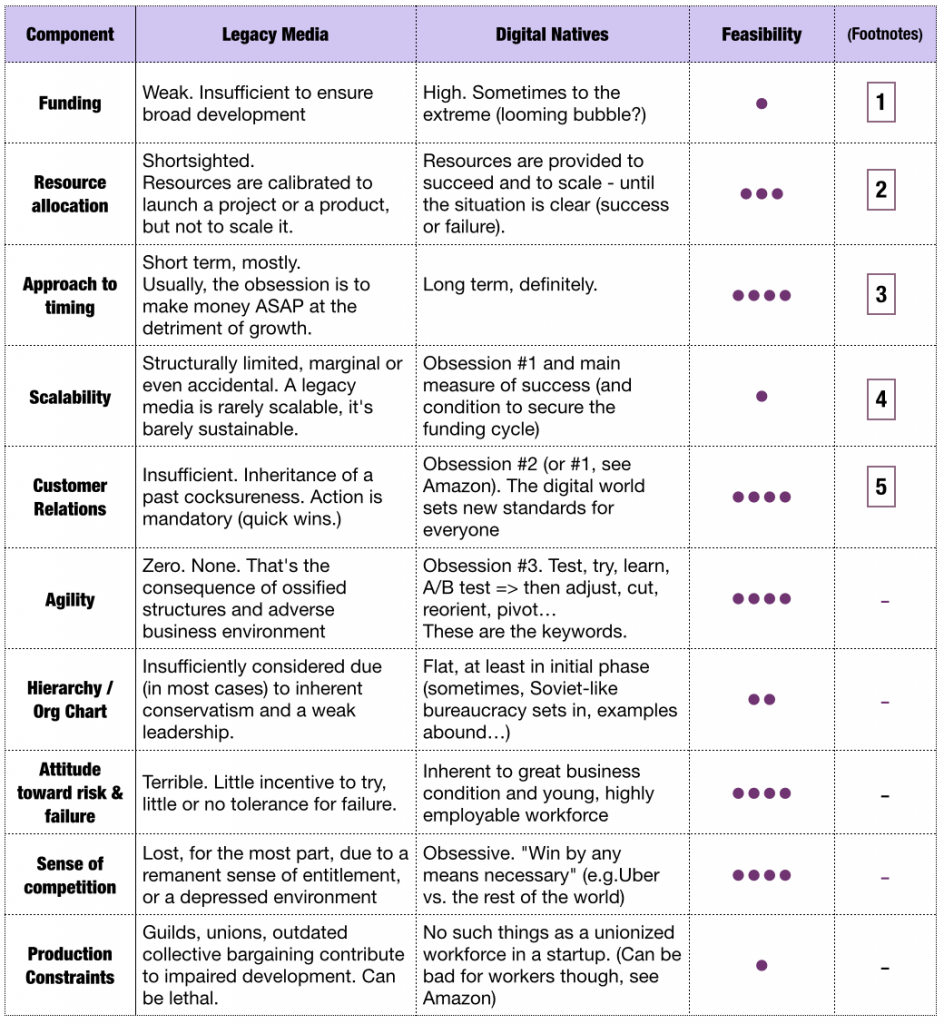
12pm - An almost fool-proof way of detecting a fake social media following
Yesterday, a Climate Specator article asserted that US coal giant Peabody Energy has been paying for social media follows and likes.
So, how can you tell? Well, the usual give away is a sudden jump in the number of followers for a social media account.
Twitter
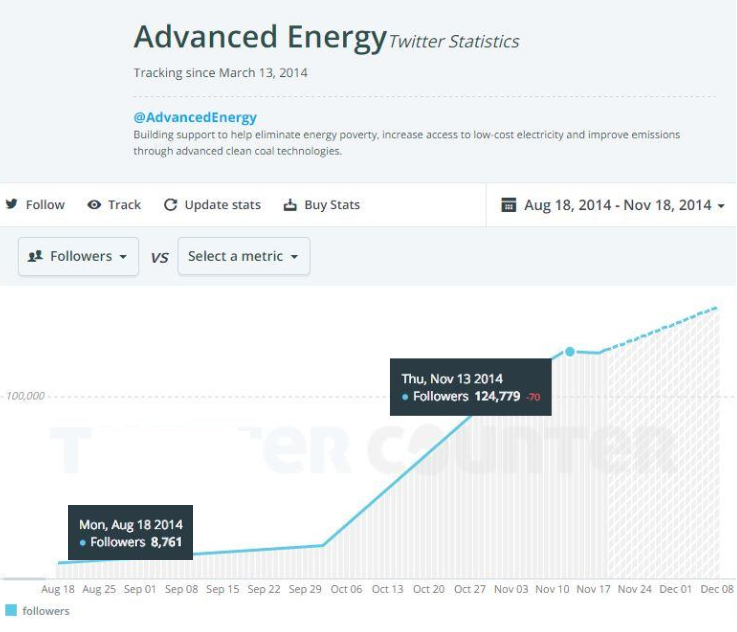
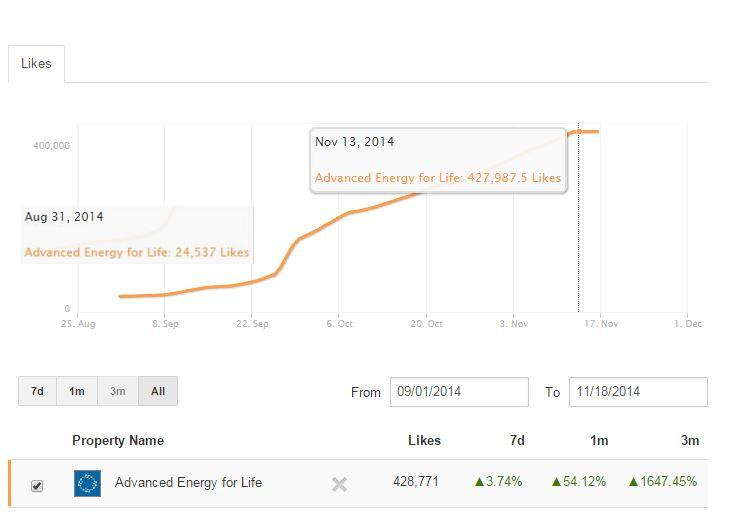
No social media community manager is that good. Though, there is one exception that could explain a sudden uptick in Facebook likes: Modi.
We mentioned in our links today that Tony Abbott could be buying followers from India. Well, it turns out he isn't. As Buzzfeed Australia revealed, he just took a viral selfie with the insanely popular Indian Prime Minister Narendra Modi.
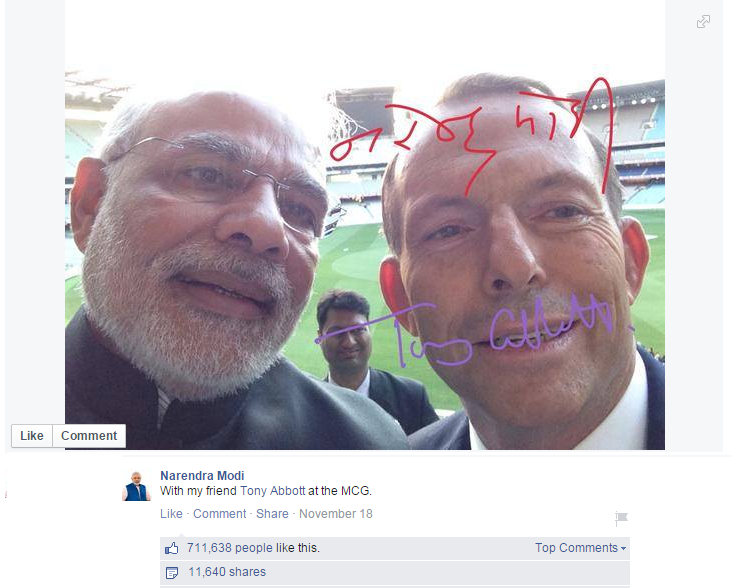
And on the same day his follower count leaped higher.

Read the full Climate Spectator article about Peabody Energy here.
10.40am - Apple becomes first company to top $US700bn market value
By AFP and Chris Kohler, BusinessNow

A rise in Apple shares has pushed the market value of the trend-setting US tech icon above $US700 billion ($757bn), becoming the first company to hit that milestone.
Just to be clear -- that's more than the GDP of Malaysia ($US693bn) and more than Mexico's national debt ($US629bn).
Apple shares rose nearly 1 per cent in morning trade to $US119.75, making its market capitalisation some $US701.7bn.
The shares went on to fluctuate within a narrow range throughout the day.
The maker of the iPhone and iPad is by far the world's most valuable company by stock market value, well ahead of Exxon Mobil at $US403bn and Microsoft at $US394bn.
Investors and analysts were upbeat on Apple at the start of the holiday shopping season, expecting strong sales during the gift-giving period that kicks off in the US with Thursday's Thanksgiving holiday.
“We believe the stars are well aligned for Apple to shine bright this holiday season,” Brian White at Cantor Fitzgerald said in a research note, adding that he expects to see heavy demand for the new iPhone models and a refreshed line up of iPads.
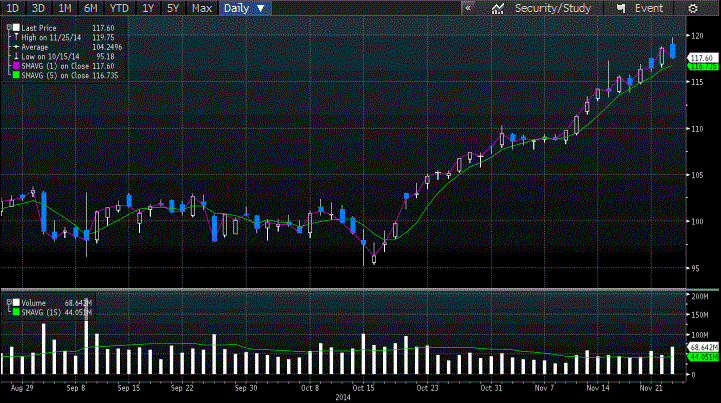
10.20am - Does age matter? A Q&A with two young hotshot executives
In an era of ever-changing business models and disruption, the idea of ‘paying your dues' before moving up the leadership chain is fast being undermined. You only have to look at BRW's young rich list to understand that technology is doing far more than just reshaping industries, it's also breaking down management preconceptions around age and experience. The trend is largely being driven by tech start-ups but its slowly seeping into the rest of corporate Australia.
In light of this, The Ticker spoke to two young executives, from two very different industries (mining and online retail), nominated for young executive of the year category in this year's The CEO magazine's executive of the year awards. The winner is set to be announced tomorrow night. Here's what they had to say:
Raleigh John Finlayson, managing director, Saracen Mineral Holdings
Is age a barrier for executives? Does your age put you at any disadvantage to your peers? And if so, how did you overcome it?
The 'right' age is a fine balance between grey hair and experience, versus youthful enthusiasm and ambition. Over exuberance can be portrayed as potential recklessness and therefore would be a definitive disadvantage. I overcame this by admitting I didn't know everything, remaining humble at all times and demonstrating that I was a part of a highly capable and experienced board and management team with a blend of experience and youthfulness able to achieve great things, which we have.
Success can come at a cost. Did you make any sacrifices to attain your current position?
I enjoy my job and I love my industry, I have been blessed to be a part of it and hopefully contributed in a positive way, therefore I am comfortable that I have conducted myself in a professional manner and haven't sacrificed my integrity. So, from a work perspective, no regrets or sacrifices. My only wish would have been to balance my work life with spending more time with my beautiful (and considerate) wife and two girls (aged 8 and 5). Maybe that's a good News Year's resolution. More time with the fam!
Do you have any advice for Australian's aspiring to become a young executive?
The key for young executives is recognising that you don't know everything and blending your enthusiasm and instinct with those who have seen it all before -- have many mentors who can guide you. There is a fine balance between your eagerness to demonstrate your competence as a young executive and being overly cocky (it's unAustralian). You have two ears and one mouth, listen twice as much as you talk, especially when getting advice from older executives.
Turning that last question on its head, do you have any advice for older executives for dealing with young ambitious workers?
Be like my mentor, Guido Staltari, retiring Chairman of Saracen. Give your pupil the space needed to grow (enough rope if you like). However, be available to shoot the breeze, your role as a sounding board can't be underestimated. Be critical when appropriate, but in a constructive way. Finally, enjoy being a mentor and having your apprentice hanging off your every word and accepting the task of 'making you proud'. It's just like being a mum or dad, the greatest job in the world.
Adam Jacobs, managing director and co-founder, The Iconic
Is age a barrier for executives? Does your age put you at any disadvantage to your peers? And if so, how did you overcome it?
Age is absolutely not a barrier for executives. Albert Einstein was 26 when he wrote the Theory of Relativity! I believe a strong leader pays little attention to self-implied limiting beliefs, such as age or even specific expertise. Leadership is a skill that combines clear vision with execution rigour and strong values, and can be displayed as much from a seasoned board director as it can from a 10-year-old on the soccer pitch. Any perceived age disadvantage, or any other limiting belief, quickly falls away once strong leadership skills are recognised.
Success can come at a cost. Did you make any sacrifices to attain your current position?
More than sacrifice, I think there are trade-offs we must weigh when making career path decisions. The key is to judge carefully when to take a risk, often when your gut supports it, and to not look back. I am very fortunate to be a leader at The Iconic and any sacrifice I may have made does not measure up against the reward of building a company that is setting the future of Australian fashion retail.
Do you have any advice for Australians aspiring to become a young executive?
My best advice: give more than you get. Success comes from hard work more than anything else -- from responding to your failures and always taking a humble approach to learning. If you always give more than you get, people will want you on their team, you'll learn faster, and win more often than not.
Turning that last question on its head, do you have any advice for older executives for dealing with young ambitious workers?
Last night I met an extremely impressive executive who is the regional head for a large fashion brand. He was immensely curious, not once displaying any sign of inertia or stigma, and always looking to learn whilst staying true to his principles. I think the recipe for success remains the same no matter what stage of your career -- stay humble, always learn, invest in relationships and lead by example.
9am - Interesting reads from around the web
That's one way to gain popularity: Has Tony Abbott been sprung buying Facebook likes?
Harsh, but effective: How a hedge fund manager toppled a company's management to cut an airport queue.
Some helpful reading for that holiday you're planning: When should you book that flight? The truth about airline prices.
For all of your spying needs: Why drones are the best holiday gift this Christmas.
The bright side of climate change: The Nordic wine industry is booming.
















